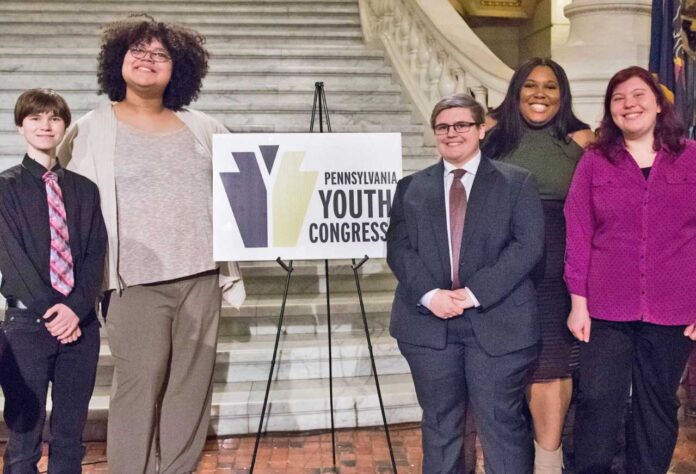Since 2011, the Pennsylvania Youth Congress (PYC) has continued to remind people that the work done for LGBTQ rights is not just carried out by veteran politicians on the floor of the State House. In order for progress to expand and continue, youth who identify as members of the queer community, and their allies, must engage with peers about the future they want to build. What issues make them feel like they are counted in the Commonwealth? What makes them feel comfortable as members of the electorate? And what makes them hopeful about the future both for themselves and for citizens of Pennsylvania?
PGN spoke with three representatives of the PYC. Preston Heldibridle is a gay, transgender man currently studying at Harrisburg Area Community College. He has been with PYC four years now and serves as the State Policy Associate. His work began in high school when protections for the Obama Administration’s Title XI was rescinded. He describes fear back then among his classmates and himself knowing that LGBTQ students were at risk — and still could be.
“My GSA advisor pulled me aside in the hall later that day to ask if I wanted to join a round table discussion hosted by PYC with Dr. Rachel Levine,” he said, explaining this is where his passion began for advocacy. “I kept finding opportunities to act on problems facing our community with PYC, and I kept seeing our efforts make a difference in the lives of the people around me, which is why I’m still here and passionate as ever about the work we do.”
Hildebridle’s work extends to the needs of all queer Pennsylvanians, especially fighting for non-discrimination laws which can protect constituents from being fired or losing housing over their gender identity, as well as healthcare, which is a mounting and sadly continual concern for trans youth.
“Every Pennsylvanian deserves access to the care that allows us to live in a state of physical, mental, and social well-being,” Hildebridle explained.
This is important work which must be carried on at the local level so these protections may extend across the state. According to PYC’s website, the Commonwealth has “the most number of LGBTQ-inclusive local nondiscrimination ordinances adopted of any state in the nation.”
Sadly, that number is still alarmingly low. Out of almost 2600 Pennsylvania municipalities, only 60 have such protections. That disparity is something PYC has worked with local communities to help change. They recently helped Bloomsburg, Pennsylvania become just the third small town community in Pennsylvania to enact an LGBTQ nondiscrimination ordinance, and they have been working with the community in Gettysburg, which will vote on similar protections in December. Such advocacy can be done regardless of who is in the White House or who controls the state legislature, and it’s a good reminder that, as the saying goes, all politics is local.
Angie Poole, 24, is a graduate of Susquehanna University in Selinsgrove, PA who identifies as a gender non-conforming lesbian. Currently they serve as PYC’s Advocacy Coordinator. She worked in the campus office for diversity and inclusion during her time at university.
“I went into college knowing I wanted to do some form of advocacy work, and so it all lined up and connected.” Of her work with PYC, Poole finds engaging with young and future voters is key. “Working with other young people across PA has shown me how each community has their own needs, and as well as being active in Harrisburg, PYC will continue reaching out to help young people make change in their own communities.”
PYC’s executive director Jason Landau Goodman, who co-founded the organization, said that LGBTQ advocacy work, especially in a state as diverse as Pennsylvania, involves working with people of all political and cultural demographics, including Democrats, Republicans, and Independents.
“We are a fiercely non-partisan organization. We work with public officials regardless of political party to advance LGBTQ inclusion and social justice in Pennsylvania. We have seen our issues become political footballs, which sometimes provides wins and other times losses. Our work outside of partisan politics allows us to press against divisnessness on the lives of LGBTQ people so that we can truly move forward across the commonwealth.”
Much work is to be done. This article is going to print before the 2020 presidential election is yet to be decided. While it will not necessarily determine all legislation for the LGBTQ community in Pennsylvania, it certainly will shape the future.
“I think my biggest concern is that no matter who wins, everyone is going to be exhausted from the election season. When so many people are functioning with so little mental and emotional capacity, it’s hard to think outside of the day to day tasks,” Poole said. “I also worry what messages the outcome of this election will send to young LGBT people who either are participating in their first major election or not yet able to vote. So many older adults already feel that their vote and voice doesn’t matter, and young people shouldn’t be made to feel the same way.”
Landau Goodman stressed the need, always, for hope in light of this tumultuous election year.
“I worry many of us will fall into despair. We cannot do that. It’s important to honor how we feel, but never give up hope. We’ve seen those before us fiercely fight in grave circumstances and prevail. We can and must continue to put our hands to the plough for love and justice.”

